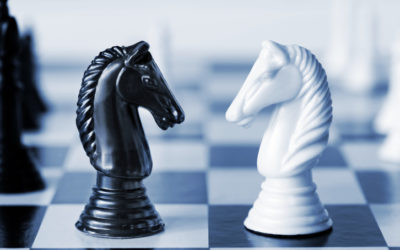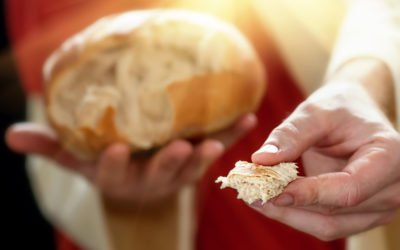 Now that we have come to the Lord and we were born again, God doesn’t want us to have an evil conscience anymore, but a good and perfect conscience. He doesn’t want us to be conscience-ruled. He wants us to purge and cleanse ourselves from an evil conscience. There is a better way to relate to the Lord.
Now that we have come to the Lord and we were born again, God doesn’t want us to have an evil conscience anymore, but a good and perfect conscience. He doesn’t want us to be conscience-ruled. He wants us to purge and cleanse ourselves from an evil conscience. There is a better way to relate to the Lord.
Now, let’s see how our conscience in conjunction with our behavior can generate two types of consciousness that are both detrimental to us: a consciousness of dead works and a consciousness of sin. As we already know, our conscience announces us when we did something wrong. When the conscience is quiet for a longer period of time because maybe we do some good works, we are moral, or maybe we don’t violate most of God’s commands, we may begin to think and feel, without even realizing, that we have become worthy of God’s favor and entitled to His blessings and power because of our works. In that moment, we have formed a consciousness or an awareness of our good works. The Bible calls that the consciousness of dead works and I will explain better in a moment what dead works are. Likewise, when the conscience tells us repeatedly for a longer period of time (and we allow it to do so) that we did wrong, that we sinned before God, and that we failed, it makes us feel condemned and unworthy of God’s favor, blessings, and power. In that moment, we have formed a consciousness and an awareness of sin, a mentality that we are still sinners. Neither of these two types of consciousness are good. A perfect conscience is a conscience that we don’t allow it to rely on good works for approval before God, neither to condemn us because of sin. The book of Hebrews covers both of these cases in chapters 9 and 10. Let’s read first the passage in chapter 9:
Hebrews 9:9–14 (NKJV)
9 It was symbolic for the present time in which both gifts and sacrifices are offered which cannot make him who performed the service perfect in regard to the conscience—
10 concerned only with foods and drinks, various washings, and fleshly ordinances imposed until the time of reformation.
11 But Christ came as High Priest of the good things to come, with the greater and more perfect tabernacle not made with hands, that is, not of this creation.
12 Not with the blood of goats and calves, but with His own blood He entered the Most Holy Place once for all, having obtained eternal redemption.
13 For if the blood of bulls and goats and the ashes of a heifer, sprinkling the unclean, sanctifies for the purifying of the flesh,
14 how much more shall the blood of Christ, who through the eternal Spirit offered Himself without spot to God, cleanse your conscience from dead works to serve the living God?
If we put together verses 9 and 14, we can notice that to be made perfect in regard to conscience is to have our conscience cleansed of dead works. The Old Testament Law of sacrifices could not do that. What are dead works?
When believers in Christ think that because they fasted and prayed much, or because they didn’t do immoral things, or because they did some work of service for God, God should bless them or work with power through them, then their conscience is evil and full of dead works that needs to be cleansed of. Believers need to have the consciousness of Christ’s righteousness, and be aware of the fact that their approval before God, the favor of God, and the blessings of God are based only on Christ’s righteousness and not on their good works or spiritual disciplines. Not being conscious of our good works doesn’t mean that there is no absolute good in the world; it doesn’t mean that we should be oblivious to any good work or deny that good exists. Good works are good, God loves them and we should pursue them in greater measures. In fact, God is the One that has already prepared many good works in advance for us in Christ, that we should walk in them (Ephesians 2:10), for which He will also reward us at the end. However, not being conscious of our good works means to not rely on those good works in our mind as a basis for receiving something from God. The same is with spiritual disciplines like fasting, praying, worshipping, or meditating on the Word. They are all very good and need to be done, because they change us and our mind to release greater faith in our lives, which will materialize more blessings for us into the natural world. However, these disciplines don’t change God, neither make Him do anything for us. He has already done everything for us and given us everything. The disciplines just help us to acquire faster and in a greater measure what God has already given us. Now let’s read about the other case of consciousness in Hebrews 10:
Hebrews 10:1–4 (NKJV)
1 For the Law, having a shadow of the good things to come, and not the very image of the things, can never with these same sacrifices, which they offer continually year by year, make those who approach perfect.
2 For then would they not have ceased to be offered? For the worshipers, once purified, would have had no more consciousness of sins.
3 But in those sacrifices there is a reminder of sins every year.
4 For it’s not possible that the blood of bulls and goats could take away sins.
This passage talks about not having a consciousness of sins anymore. That has been accomplished in Christ, but it could not have been accomplished during the Law. Atonement in the Old Testament just covered the sins temporarily. The blood of Jesus didn’t just cover our sins when it made atonement for us, but cleansed us from all our sins forever. Our sins – both past and present as well as future ones – have all been removed and taken away once and for all. That is why we should no longer be conscious of our sins. We shouldn’t see ourselves as sinners anymore, even when we still sin, because our future sins have been removed as well. Not being conscious of our sins doesn’t mean that sin is not sin anymore, that evil doesn’t exist, or that God has became softer with sin; it rather means not to focus on our sinful deeds, but on Christ’s righteousness. It means that on a continuous basis, when our conscience condemns us of something that we did wrong, we don’t dwell on our conscience’s condemnation, but come quickly in agreement with what the Word of God says about us, that we are still righteous through Christ, because the blood of Jesus has already removed that sinful deed.
I heard some preachers saying that in the New Covenant, not having a consciousness of sins means that there is no real good or evil anymore in the face of God, but only the Holy Spirit is now the One deciding what is good or evil, even though some of those decisions and deeds might have been considered evil in the Old Testament. For instance, lying is clearly a sin in the Bible, but in certain circumstances, it could be viewed not as a sin. If the government persecutes the church and they ask us to tell them where our brothers and sisters are hidden, what do we do? Do we tell them or do we lie that we don’t know? Some say that lying in this case is not a sin because it’s done out of love for the brethren. Is it really so? In other words, the purpose justifies the means. What if there is another option that we haven’t seen yet, where we both protect our brothers and sisters and we don’t have to lie either? If we think about the instance when the Pharisees brought the woman caught in adultery to Jesus, humanly speaking, it seemed that Jesus had no way of escape out of that dilemma. On one hand, if He said, “Don’t kill her,” He would have been against the Law and would have attracted people’s rage. On the other hand, if He said, “Kill her,” then nobody would have believed anymore in His message of love and mercy. However, in God’s wisdom, Jesus came up with a third alternative that nobody thought of, where He preserved both the Law and His message of love. He succeeded in harmonizing two apparent contradictory things: the justice of the Law with the love of the Father. In the same way, not having a consciousness of sins doesn’t mean that good can become evil and evil can become good, based on the circumstances. Good is still good, and evil is still evil; but we have to focus on Jesus’ righteousness that fulfilled all the good and paid for the punishment of all evil. In Him, justice and love embraced each other, truth and mercy have met together, and righteousness and peace kissed each other, as it’s written in Psalm 85:10:
Psalm 85:10 (NKJV)
10 Mercy and truth have met together; righteousness and peace have kissed.
It’s so sad to see today that in most churches the consciousness of sins is cultivated instead of the consciousness of righteousness. “Oh, we need to search our hearts, examine ourselves and our deeds, and make sure that we are right with God. We need to make sure we confess all our sins,” when in fact, God expects us to not even think about sin, since we have been purified once and for all, as Hebrews 10:2 says. Let me give you an example. If you borrowed money from someone, is it not true that every time you meet your lender you will have your debt on your conscience? You will have a sense of debt. By the way, before lending money to anyone, think twice, because there is a high chance of losing that relationship. Either you can bless that person with the money instead of lending if you can, or maybe you don’t lend it at all. As long as you have that sense of debt, it will make you avoid the presence of your lender. In the same way, if you always have a sense of debt before God (and that is what sin-consciousness is), you will want to avoid God as much as possible, you will run away from Him, because He reminds you of your debt. However, if you have no consciousness of sins, then you can come anytime freely before God.
Let’s say you go to your favorite restaurant and order everything you like, and when you go to pay, the waiter tells you that someone else paid the bill for you and that he just wanted you to enjoy it. Now, if the waiter didn’t tell you that someone else paid, was it still paid? YES. If the waiter didn’t tell you that someone else paid, wouldn’t that bill be still on you? YES. That is exactly the problem with the world today. Jesus had paid for all our sins, but the waiters are not informing us of the full payment of our debt.
Verses 1 and 2 of Hebrews 10 say that the Law was a shadow of the good things to come; and the good things to come were these: (1) the worshippers would be cleansed once and for all; (2) they would cease to offer repeated sacrifices; (3) and they would no longer have a consciousness of sins. Has Jesus’ sacrifice worked? If it worked, then we should no longer have any consciousness of sins.
Why are Christians today still so sin-conscious? Because sin-consciousness is preached many times from the pulpit thinking that it will help believers not to sin. Even though the preachers might be well-intended, this is wrong.
Listen / Watch / Download
You can listen to the audio message of this article, watch the video message, or download it in various formats (mp3 / mp4 / pdf) from the following link:






